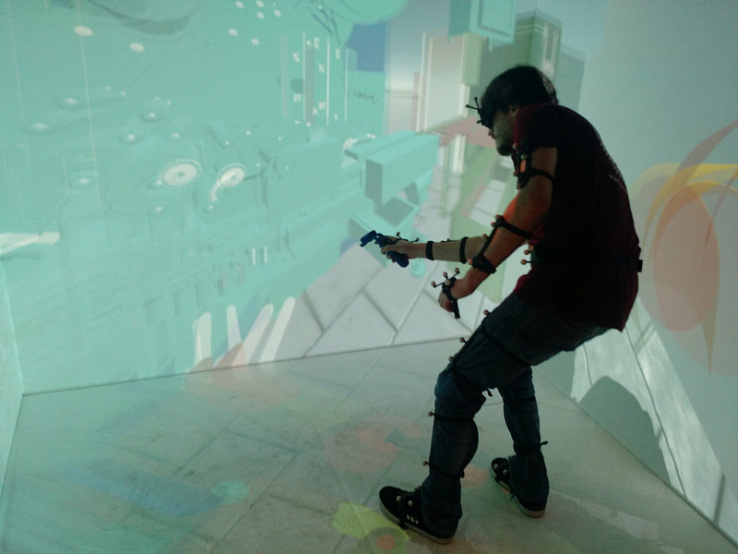

Pokémon; Macbeth; the Illuminati. Those may not sound like they have a lot in common, but they exemplify the three whole new forms of technology-driven entertainment that have erupted in recent years. We’ll soon combine all three–and, eventually, use them to create whole new multi-faceted immersive worlds that will make today’s entertainment look like radio dramas.
Augmented Reality
At last! For years augmented reality has waited for its messiah, its killer app; and at last, undisputably, here it is. I mean, of course, Pokémon Go, yet another overnight hit 10 years in the making. Vernor Vinge basically predicted it a decade ago, while William Gibson was writing about augmented-reality “locative art.” In the years since, informative AR apps like Layar and Broadcastr rose, fell, and died unnoticed. A small but devoted hardcore has been playing Ingress, and thereby basically playtesting PG, for years. And now, finally, we have a bona fide hit.
Why did we have to wait so long? Partly for sufficiently powerful hardware to become ubiquitous. (I still remember how Layar stuttered on my first Android phone.) And largely, as Darrell Etherington points out, because of Pokémon’s pre-existing “tremendous success as a media property.”
We will now doubtless see an explosion of failed copycats … and also major franchises looking for their own AR hit. (Marvel Universe? The Bourne Reality?) And we should also see new, more immersive AR hardware launch soon, such as much-awaited, billion-dollar-funded Magic Leap‘s debut product.
Immersive Reality
In case you haven’t noticed, immersive theater is huge right now. New York City, Orlando, Los Angeles — wherever you look, new immersive theatrical experiences are popping up. These are to traditional theater as open-world games like Grand Theft Auto are to linear games like Halo. And you’ll note that, once again, the most successful examples are the ones which build on a known franchise: Sleep No More, a (very loose) adaptation of Macbeth, and Then She Fell, inspired by Alice in Wonderland.
Theater is, of course, only one form of reality. Real-life immersive games like escape rooms have become wildly popular over the last decade as well, as have “haunted house experiences.”
I would argue that all of the above create the illusion of Temporary Autonomous Zones, a concept named and popularized by the anarchist writer Hakim Bey–and which in turn inspired Burning Man, itself an immersive reality, and its ilk.
The great virtue and tragic flaw of TAZs is that they don’t scale; they are experiences unique to the few who are physically there. Even Burning Man only has room for 70,000 people each year. They are ideal for intimate, personal experiences. But not for any kind of mass cultural commons–
–or at least they weren’t, until technology made it possible to have globally scalable immersive experiences. I refer, of course, to virtual reality — when it matures.
Alternate Reality
Older than AR and VR, and currently slightly out of favor, alternate reality games use the real world as a platform, and imbue ordinary, unaugmented existence with secret meaning and purpose, by sending cryptic messages, delivering mysterious packages, leaving hidden clues that only initiates will recognize, etcetera.
ARGs have often been used to promote more traditional media: The Beast for the movie AI, I Love Bees for Halo 2 — once again, leveraging an existing franchise. And of course the notion of a hidden layers of esoteric meaning interwoven with ordinary reality is an insanely common fictional trope: see The X-Files, The Da Vinci Code, Foucault’s Pendulum, and every conspiracy theory ever told. But there are original examples as well, such as San Francisco’s late, lamented Latitude Society.
Three Legs of a New Storyteller’s Stool
I put it to you that we’re going to see more and more of all three of the above forms of storytelling and gaming. That’s pretty uncontroversial. More interestingly, I predict we’ll start to see combinations of them; experiences which start as augmented reality on your smartphone, progress to alternate-reality messages in real-world billboards and Instagram feeds, and encounters with paid actors, and eventually, if you’re willing to pay the subscription price to keep playing, lead you to a house or warehouse tricked out as an immersive theater, and/or a key to a secret VR landscape — while countless others are also playing, and collectively changing the ongoing shape of the story.
Is that a mixed-reality game? A role-playing game? Immersive theater? Any and all of the above, and something for which we need a new name? I look forward to finding out–and between Pokémon Go, Sleep No More, Oculus Rift, the Latitude Society, and other new shoots too numerous to cite, I suspect I won’t have to wait all that much longer.

